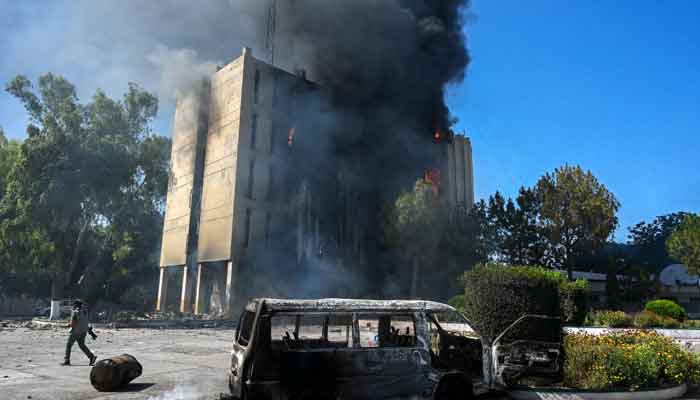Proclamation of emergency remains an option if disturbance continues
Under the Constitution, a proclamation of emergency shall be laid before a joint sitting
ISLAMABAD: Proclamation of emergency in Punjab and KP remains an option if the ongoing disturbance furthers.
The Constitution of Pakistan provides for such a situation if internal disturbance goes beyond the power of a provincial government.
The Article 232 of the Constitution provides for the proclamation of emergency. It envisages if the President is satisfied that a grave emergency exists in which the security of Pakistan, or any part thereof, is threatened by war or external aggression, or by internal disturbance beyond the power of a provincial government to control, he may issue a proclamation of emergency.
In such a situation, the President is bound to act on the advice of the Prime Minister. However, for the imposition of an emergency due to internal disturbances beyond the powers of a provincial government to control, a resolution from the provincial assembly shall be required.
But in the present situation, the provincial assemblies in both the provinces -- Punjab and KP where the PTI protesters have become violent and attacked state institutions -- are already nonexistent after having been dissolved early this year.
According to the Constitution, if the President acts on his own, the proclamation of emergency shall be placed before both parliaments for approval by each House within ten days. While a proclamation of emergency is in force, the parliament shall have the power to make laws for a province, or any part thereof, with respect to any matter not enumerated in the Federal Legislative List.
Once the emergency is imposed, the executive authority of the Federation extends to the giving of directions to a province as to the manner in which the executive authority of the province is to be exercised. While a proclamation of emergency is in force, according to the Constitution, Parliament may by law extend the term of the National Assembly for a period not exceeding one year and not extending in any case beyond a period of six months after the proclamation has ceased to be in force.
Under the Constitution, a proclamation of emergency shall be laid before a joint sitting, which shall be summoned by the President to meet within thirty days of the proclamation being issued and shall cease to be in force at the expiration of two months unless, before the expiration of that period, it has been approved by a resolution of the joint sitting.
The Constitution also envisages while the proclamation of emergency is in force, the President may, by order, declare that the right to move any court for the enforcement of such of the Fundamental Rights conferred by Chapter 1 of Part II as may be specified in the order, and any proceeding in any court which is for the enforcement, or involves the determination of any question as to the infringement, of any of the rights so specified, shall remain suspended for the period during which the proclamation is in force, and any such order may be made in respect of the whole or any part of Pakistan.
-
 Maria Shriver Shares Heartbreaking Reminder After Eric Dane's Death: 'Next Week Isn't Guaranteed'
Maria Shriver Shares Heartbreaking Reminder After Eric Dane's Death: 'Next Week Isn't Guaranteed' -
 Andrew Mountbatten Windsor Gets New Moniker After Losing ‘Prince’ Title
Andrew Mountbatten Windsor Gets New Moniker After Losing ‘Prince’ Title -
 Jack Black Shares Unseen Moments With Tanya Haden: 'My Love'
Jack Black Shares Unseen Moments With Tanya Haden: 'My Love' -
 Shamed Andrew Made Taxpayers Fund Personal ‘massages’
Shamed Andrew Made Taxpayers Fund Personal ‘massages’ -
 What Could Be Nick Reiner's Fate After Pleading Not Guilty Parents’ Murder Case?
What Could Be Nick Reiner's Fate After Pleading Not Guilty Parents’ Murder Case? -
 Princess Kate Talks About 'hard Conversations' With Kids Amid Andrew Drama
Princess Kate Talks About 'hard Conversations' With Kids Amid Andrew Drama -
 Prince William Mocked For Being ‘most Reluctant’ King-in-waiting
Prince William Mocked For Being ‘most Reluctant’ King-in-waiting -
 Prince William Makes Rare Admission After Andrew Arrest
Prince William Makes Rare Admission After Andrew Arrest -
 ‘Got A Lot Of People Gunning For Me’: Trump Makes First Comments On Mar-a-Lago Intruder
‘Got A Lot Of People Gunning For Me’: Trump Makes First Comments On Mar-a-Lago Intruder -
 What Countries Have A Say In Andrew Removal From Line Of Succession?
What Countries Have A Say In Andrew Removal From Line Of Succession? -
 How Did Luci4 Die? Police Probes 'BodyPartz' Sudden 'suspicious' Death
How Did Luci4 Die? Police Probes 'BodyPartz' Sudden 'suspicious' Death -
 King Charles Criticized By Princess Anne Over Andrew Drama
King Charles Criticized By Princess Anne Over Andrew Drama -
 Hailee Steinfeld Details Preparations Ahead Of Welcoming First Kid With Josh Allen
Hailee Steinfeld Details Preparations Ahead Of Welcoming First Kid With Josh Allen -
 Shocking Details Revealed About Gunman 'Austin Tucker' Shot Dead At Trump’s Resort 'Mar-a-Lago'
Shocking Details Revealed About Gunman 'Austin Tucker' Shot Dead At Trump’s Resort 'Mar-a-Lago' -
 Queen Camilla Meets Gisèle Pelicot, Sends Powerful Message To Victims As Andrew's Scandal Deepens
Queen Camilla Meets Gisèle Pelicot, Sends Powerful Message To Victims As Andrew's Scandal Deepens -
 Cancer-stricken King Charles At Breaking Point?
Cancer-stricken King Charles At Breaking Point?




